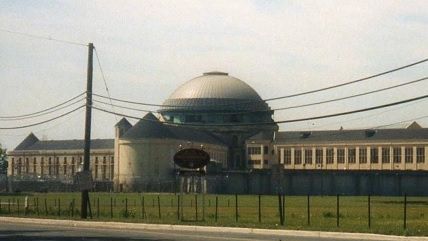New Jersey Has a Law That Makes It a Crime Not to Surrender Your Drugs to Police
President Obama says marijuana shouldn't be a priority for young people, but all the young people whose lives have been ruined by the drug war would disagree.


Fifth Amendment says what? Recently I learned a couple of my students from the days I taught seventh grade English and History in Newark, about a decade ago, have collected rap sheets, almost exclusively related to "controlled dangerous substances," the legal term for drugs. In a recent Vice interview, President Obama told young people legalizing marijuana ought to be low on their list of priorities. Instead Obama suggested young people get interested in the same issues the political class believes the rest of the electorate cares about, or ought to—climate change, the economy, foreign policy. Obama said marijuana belongs "way on the bottom" of the list, if it belongs on it at all.
Obama, of course, ought to know better. And he certainly paid lip service to some of the issues arising from refusing to legalize marijuana. As Jacob Sullum noted last night:
The president is more comfortable criticizing "disproportionate prison sentences." He says "our criminal justice system" is "skewed towards cracking down on nonviolent drug offenders," which has "a terrible effect on many communities, particularly communities of color, rendering a lot of folks unemployable, because they [have] felony records." While "substance abuse…is a problem," Obama says, "locking someone up for 20 years is probably not the best strategy."
Here, Obama ought to know better. Even if he didn't read the Department of Justice's report on Ferguson, surely he read the news stories about it. In Ferguson, there are almost as many arrest warrants as there are residents. No shit. Many of these warrants—how many is not made clear by the DOJ—are for minor traffic infractions. The arrest warrants are largely a product of the police department being used as a revenue collection agency. This is important. A number of the arrest warrants in Ferguson are presumably also for drugs, even for "nonviolent drug offenders." In other jurisdictions, marijuana decriminalization is coupled with new fines for possession, revealing how the drug war, too, is in part a revenue collection exercise.
Keeping marijuana criminalized because people like Barack Obama—rich, affluent elites who have admitted to drug use in their youth—don't think the rest of us can handle making decisions about our bodies also creates ample opportunity for constitutional rights violations. Take this example from the DOJ Ferguson report:
In another case, officers responded to a call about a man selling drugs by stopping a group of six African-American youths who, due to their numbers, did not match the facts of the call. The youths were "detained and ped checked." Officers invoke the term "ped check" as though it has some unique constitutional legitimacy. It does not. Officers may not detain a person, even briefly, without articulable reasonable suspicion. To the extent that the words "ped check" suggest otherwise, the terminology alone is dangerous because it threatens to confuse officers' understanding of the law. Moreover, because FPD does not track or analyze pedestrian Terry stops [where courts allow cops to briefly detain people under reasonable suspicion when no probably cause exists]—whether termed "ped checks" or something else—in any reliable way, they are especially susceptible to discriminatory or otherwise unlawful use.
Selling drugs, in case you're keeping score at home, is nonviolent. A drug dealer, then, could be considered a nonviolent drug offender too. But one of the grossest systemic rights abuses identified by the DOJ in Ferguson was the reliance on charges like "failure to comply" to produce arrests and crimes. It's not unique to Ferguson. Most local crime stories will include a slew of charges for the alleged criminal even if he's only being accused of one or two actual crimes. "Resisting arrest" is a favorite, creating a Kafka-esque scenario whenever it remains as the only charge after prosecutors have tempered police.
And here's coming back to the insane New Jersey statute that seems, at least to someone without a Harvard law degree, like it ought to be a violation of the constitutional right against self-incrimination. The statute, 2C:35-10C, via njlaws.com:
Any person who knowingly obtains or possesses a controlled dangerous substance or controlled substance analog in violation of subsection a. of this section and who fails to voluntarily deliver the substance to the nearest law enforcement officer is guilty of a disorderly persons offense. Nothing in this subsection shall be construed to preclude a prosecution or conviction for any other offense defined in this title or any other statute.
Is there a reason to slap this charge on someone already being charged with possession? This is why the "nonviolent drug offender" canard is a canard. The legal system has plenty of tools for police officers and prosecutors to charge people accused of nonviolent drug offenses as if they actually posed some kind of threat to society. Possession with intent, for example, doesn't require the state to prove an intent to distribute, only to prove that a certain quantity of narcotic was possessed. The intent is assumed. But because people like Obama insist drugs ought to be treated primarily as a cause of "substance abuse" and not a decision an adult makes about his or her own body, "intent" turns that nonviolent drug offender into someone dangerous, someone local politicians, Republican and Democrat, can use to marshal more support for more policing of just the kind Obama laments, and admits has a significantly disparate impact racially.
To many employers, a criminal record is a criminal record. Some liberals insist the solution is to permit non-violent drug offenders (however you define them) to be able to expunge their records, with hella strings attached. But the solution to all of this is to stop treating adults like children, like they've never left school. Allow them to make decisions about what they want to put into their own bodies, instead of using it as an excuse for a massive jobs program for police, prosecutors, substance counselors, and so on at the expense of mostly young people of the poor, black, and male variety. The president ought to check his privilege before telling young people their priorities ought to be where the political class and its hangers-on can make a buck (climate change, the "economy") and not where young people's freedoms and future income-earning potentials are at stake.


Show Comments (52)